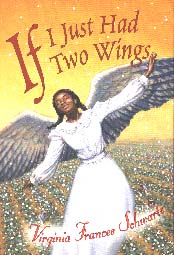| ________________ CM . . .
. Volume VIII Number 5 . . . . November 2, 2001
excerpt:
Freedom, the whisper that builds to a roar, resonates among slave populations throughout the South during the early days of the American Civil War, 1861. On Master Williams' plantation, only Phoebe and her parents remain; two sisters and a brother have been sold, one sister has run away. Picking cotton daily now that she's 13, Phoebe dreams and chatters, her mind far from the drudgery of the Alabama fields. Dreams help Phoebe escape the harsh realities of her daily life encouraged by Old Willie, the resident Underground Railroad conductor: "Gotto dream child . . . or you'll be stuck in this here plantation forever." Her parents urge Phoebe to maintain the status quo, fearful of losing their last child. "If I just had two wings," Phoebe wishes, "I'd fly to freedom too!" The "bright freedom light" fascinates Phoebe as does tall, elegant Liney, a recent addition to the plantation's slave population. Phoebe warns Liney of the Master's intention to sell her for $1000 and to separate her from her two children. A panicked Liney runs, and Phoebe witnesses the consequences for runaways when Liney is returned by her captors tied "belly down across the back of a horse," beaten, "bleedin' from everywhere," whip-burned with "rows and rows of angry red welts," tongue sliced to prevent her talking about the forbidden topic, an "underground" movement to help slaves escape. When another sale looms, a recovered Liney, her two children, and Phoebe flee, following the instructions Old Willie provided and embarking upon a perilous four-month journey from Alabama north to Canada. The runaways link up with Jake, another escapee, at the first station from which their hosts transport them to Montgomery. With "maps in their heads"and traveling only at night, they follow rivers and swamps, traverse the Smoky Mountains, raft the Kentucky, Scioto, and Ohio rivers, and finally reach Sandusky on Lake Erie, boarding the Mayflower to cross to Chatham, Ontario. Jake, who had drawn off threatening slave catchers allowing the others to continue the journey, rejoins them at the Lake Erie crossing. Schwartz's extensive research allows her to incorporate historically documented stations on the runaways' route: Ripley Station, Union Camp, Patterson's Station, Alum Creek, Dr. Tilden's barn. Code words, passwords, visual signs, and oral signals move the runaways along the railroad. They battle hunger, fatigue, fear, treacherous terrain, and "lung fever," alert to the constant threat of slave catchers, Union soldiers, or perfidious fellow slaves. The story of Phoebe's trek to freedom via the legendary Underground Railroad, a secret network of people and places throughout the United States dedicated to helping slaves escape to Canada, resonates with the passion and determination of people seeking freedom. The perilous journey the slaves willingly undertake emphasizes their desperate desire to be free from the casual inhumanity and cruelty of the plantation owners and their overseers. In portraying the daily existence of the enslaved, Schwartz includes traditional songs that, in addition to reflecting the culture and spirit, often carried encoded messages about the Underground Railroad. Schwartz balances stark descriptions of hazards and risks with details of the warmth and camaraderie of the fugitives and the generosity and humanity of those who helped them along the way. Phoebe is an engaging protagonist whose dreamy facade masks admirable strength and determination. "The book began with Phoebe," writes Schwartz in "Author's Notes. "One night, as I was doing research on slavery, her face appeared in my mind. She looked tortured, thin, on the run. She had something she yearned to tell me." The role of dreams plays a major role in the story. "Dreams," Schwarz contends, "give us access to the past and sometimes, the keys to unlock our problems. Dreams help us to imagine new lives and also to survive in intolerable situations. Phoebe had to dream or lose hope." Schwartz, a Canadian, lives and teaches in New York. Her first novel, Send One Angel Down, winner of the 2000 Parent's Choice Gold Honor, likewise features a young slave who finds freedom. Young readers who often take their freedom for granted get a glimpse of a difficult historical era in this well-researched and carefully documented novel. Recommended. Darleen Golke is a recently retired teacher-librarian who lives in Winnipeg, MB.
To comment on this
title or this review, send mail to cm@umanitoba.ca.
Copyright © the Manitoba Library Association. Reproduction for personal
use is permitted only if this copyright notice is maintained. Any other
reproduction is prohibited without permission.
Published by NEXT REVIEW | TABLE OF CONTENTS FOR THIS ISSUE - November 2,
2001.
AUTHORS | TITLES | MEDIA REVIEWS | PROFILES | BACK ISSUES | SEARCH | CMARCHIVE
| HOME
|
